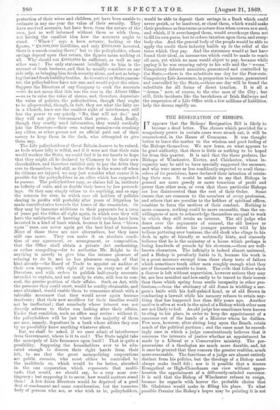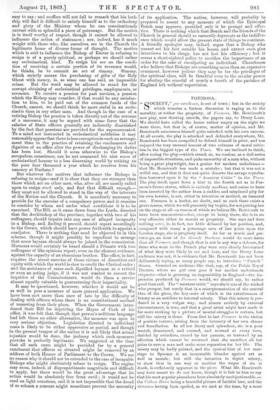THE RESIGNATION OF BISHOPS.
I T appears that the Bishops' Resignation Bill is likely to become a dead letter. The clauses which provided for a compulsory power in certain cases were struck out, it will be remembered, in the House of Commons. It was thought better to leave the matter to the wisdom and good feeling of the Bishops themselves. We now learn, on what appears to be good authority, that there is little or nothing to be hoped for from this quarter. It is said that the three prelates, the Bishops of Winchester, Exeter, and Chichester, whose in- capacity may be said to have specially suggested the measure, and who were more or less confidently expected to avail them- selves of its provisions, have declares} their intention of retain- ing their sees. It would be unfair to say that Bishops in general are more greedy or more tenacious of profit and power than other men, or even that those particular Bishops are less disinterested than the rest of their Order. Some causes that are common to the members of every profession, and others that are peculiar to the holders of spiritual offices, combine to form the motives of their conduct. Nothing is more common, nothing could be more excusable, than the un- willingness of men to acknowledge themselves unequal to work in which they still retain an interest. The old judge who dozes over the arguments of counsel, the old lawyer or merchant who drives his younger partners wild by his tedious pottering over business, the old clerk who clings to his desk in spite of friendly or unfriendly hints, and sincerely believes that he is the mainstay of a house which perhaps is losing hundreds of pounds by his slowness,—these are well- known characters. The infirmity is indeed almost universal, and a Bishop is peculiarly liable to it, because his work is in a great measure exempt from those sharp tests of failure which sometimes teach other men roughly enough what they are of themselves unable to learn. The evils that follow when a diocese is left without supervision, however serious they may be, are less manifest and less easily to be traced to their source • than those which spring from senile incapacity in other pro- fessions,—from the obstinacy of old Jones in wielding a sur- geon's knife with his half-palsied hand, or of old Brown in conducting a lawsuit while his memory refuses to retain any- thing that has happened less than fifty years ago. Another motive is often at work in the mind of a Bishop which other men are not likely to feel. An old judge has sometimes been known to cling to his place, in order to keep the appointment of a successor out of the hands of a Minister whom he dislikes. Few men, however, after sitting long upon the Bench, retain much of the political partizan ; and the cases must be exceed- ingly rare in which a judge conscientiously believes that it concerns the interests of justice whether an appointment be made by a Liberal or a Conservative ministry. The pre- possessions of a theologian are much more durable, and, let it once be granted that they concern the greater realities, much more reasonable. The functions of a judge are almost entirely distinct from his politics, but the theology of a Bishop must always make itself felt ; nor is it possible that a sincere Evangelical or High-Churchman can view without appre- hension the appointment of a differently-minded successor. It is said that the Bishop of Winchester refuses to resign, because he regards with horror the probable choice that Mr. Gladstone would make in filling his place. To what possible Premier the Bishop's hopes may be pointing it is not
easy to say ; and scoffers will not fail to remark that his lord- ship will find it difficult to satisfy himself as to the orthodoxy and piety of the Minister whom he can conscientiously entrust with so splendid a piece of patronage. But the motive is in itself worthy of respect, though it cannot be allowed to influence the action of statesmen ; nor, indeed, has it much weight with those who, like ourselves, see in the Church the legitimate home of diverse forms of thought. The motive which is said to influence the Bishop of Exeter in refusing to resign is of a purely spiritual, or perhaps we should rather say ecclesiastical, kind. To resign his see on the condi- tion of receiving a certain portion of its revenues would, he thinks, be to commit an act of simony. Simony, which strictly means the purchasing of gifts of the Holy Ghost with money, is, as some one has said, an impossible crime. But the word may be allowed to stand for the corrupt obtaining of ecclesiastical privileges, employments, or revenues. To receive a pension for past services, a pension which the Bishop may consider, if that would be any satisfac- tion to him, to be paid out of the common funds of the Church, cannot, we should think, be more sinful in an eccle- siastic than in any other man. And though in the case of a retiring Bishop the pension is taken directly out of the revenue of a successor, it may be argued with some force that the salaries of State officers generally are indirectly diminished by the fact that pensions are provided for the superannuated. To a mind not instructed in ecclesiastical subtleties it may reasonably appear that there is less corruptionin such an arrange- ment than in the practice of retaining the emoluments and dignities of an office after the power of discharging its duties has been lost. Should it seem otherwise to the Bishop's scrupulous conscience, can he not commend his nice sense of ecclesiastical honour to a less discerning world by retiring on the poor four thousand a year which he receives from his canonry at Durham ?
But whatever the motives that influence the Bishops in refusing to resign—and it is clear that they are stronger than those which act on other men, who, after all, are mostly called upon to resign work only, and find that difficult enough— they must not be allowed to stand in the way of the interests of the Nation and the Church. It is manifestly necessary to provide for the exercise of a compulsory power, and it remains to consider by whom and under what conditions it is to be exercised. The Bill, as it came down from the Lords, directed that the Archbishop of the province, together with two of his suffragans, should inquire into any case of alleged incapacity in a Bishop, and, finding it proved, should report accordingly to the Crown, which should have power forthwith to appoint a coadjutor. There is nothing that need be objected to in this scheme, though it might possibly be expedient to arrange that some layman should always be joined in the commission. Murmurs would certainly be heard should a Primate with two suffragans of like opinions report, even on the clearest evidence, against the capacity of an obnoxious brother. The office, in fact, requires the nicest exercise of those virtues of discretion and equity with which the world is slow to credit the Clerical order ; and the assistance of some such dignified layman as a retired or even an acting judge, if it was not wanted to correct the inquiries of the Commissioners, would do them a service almost equally valuable in guaranteeing their impartiality.
It may be questioned, however, whether it would not be as well to pass a measure of more general application. We have been met more than once of late by the difficulty of dealing with officers whom there is no constitutional method of removing from their place. When the Government intro- duced their Bill for depriving the Mayor of Cork of his office, it was felt that, though that person's seditious language had left them no other alternative, the measure was open to very serious objection. Legislation directed to individual cases is likely to be either oppressive or partial, and though in the present temper of the nation it is not likely that actual injustice would be done, the jealousy which such measures provoke is perfectly legitimate. We suggested at the time that all such cases might be provided for by a general enactment that officers so situated might be removed by an address of both Houses of Parliament to the Crown. We see no reason why it should not be extended to the case of incapable Bishops who might obstinately refuse to resign. The engine may seem, indeed, of disproportionate magnitude and difficult to apply, but there would be the great advantage that its action would be absolutely free from cavil ; it would not be used on light occasions, and it is not impossible that the dread of so solemn a censure might sometimes prevent the necessity of its application. The nation, however, will probably be prepared to assent to any measure of which the Episcopal Bench may approve, provided only it be prompt and effec- tive. There is nothing which that Bench and the friends of the Church in general should so earnestly deprecate as the indiffer- ence which would allow the present state of things to continue. A friendly apologist may, indeed, argue that a Bishop who cannot set his foot outside his house, and cannot even give interviews to his clergy, has not lost his efficiency ; but it seems a short-sighted policy to sacrifice the importance of an order for the sake of exculpating an individual. Churchmen• who believe that Bishops are something more than an expensive ornament, however jealous they may be for the privileges of the spiritual class, will be thankful even to the secular power for abating the scandal of nearly a fourth of the parishes of England left without supervision.































 Previous page
Previous page